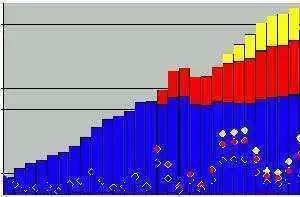.webp.f9171f6b6218615928305884036f2350.webp)
Celiac.com 08/19/2011 - According to recent estimates, 3 million Americans suffer from celiac disease - approximately 1% of the population, and only three percent of them have to this writing been correctly diagnosed. As startling as that sounds to us all, according to a news article on Medscape Today, the incidence of celiac disease has increased markedly over the last three decades, perhaps even as fourfold, and studies are suggesting the incidence may actually be higher than 1% of the population.
What is the reason for this? According to Dr. Jonas Ludvigsson, MD, from the Department of Medicine, Epidemiology Unit at the Karolinska Institute and Orebro University Hospital in Sweden, and a renowned celiac expert, there may be many factors explaining this, but there probably is an actual increase underlying these.
Celiac.com Sponsor (A12):
The Medscape article went on to report that the Mayo Clinic has confirmed increase in celiac disease incidence, reported in Discovery's Edge, the Mayo Clinic's research magazine. Dr. Joseph Murray, MD, and colleagues analyzed stored blood samples from Air Force recruits in the early 1950s for gluten antibodies. It was assumed that 1% would be positive, given today's estimates, but the number of positive results was far smaller. Dr. Murray and his colleagues compared their results with two more recently collected sets with the conclusion that celiac disease is about four times more common today than it was in the 1950's.
Additionally, Dr. Ludviggon's research team in Sweden has found that those living with celiac disease and latent celiac disease have higher mortality than those who don't have these conditions. Latent celiac disease is also known as "gluten sensitivity," a term to describe those who have "normal small intestinal mucosa but positive celiac disease serology," estimated to affect 1 in 1000 people. According to Dr. Ludvigsson's research team, in 1 year, 10 of 1000 individuals with celiac disease will die, as compared with 7 in 1000 individuals without the disease. The mortality rate is increased among those who also have latent celiac disease as well. The increased risk, however, is quite small.
As alarming as the statistics are regarding the increasing rate of celiac disease, Dr. Ludvigsson shares some good news with Medscape—the methods of diagnosing celiac disease are actually improving. According to some other estimates, the rate of celiac diagnosis rate is increasing. For those who are testing positive for the celiac disease, the only method of treatment currently available is eliminating gluten from the diet. Yes, this is a simple treatment, although it can require some challenging lifestyle adjustments for the gluten-free community, something which I address in my work as an author, researcher, and gluten-free advocate. In the future, we may see other treatments such as gluten-digesting enzymes (which are on the rise) or even the genetic modification of the structure of gluten in wheat so that it will not cause an autoimmune reaction in celiac patients. Even with celiac diagnosis incidence on the rise, with raised awareness and effective diagnosis, we can help change the lives of millions of celiac Americans for the better. This is an important endeavor.









Recommended Comments